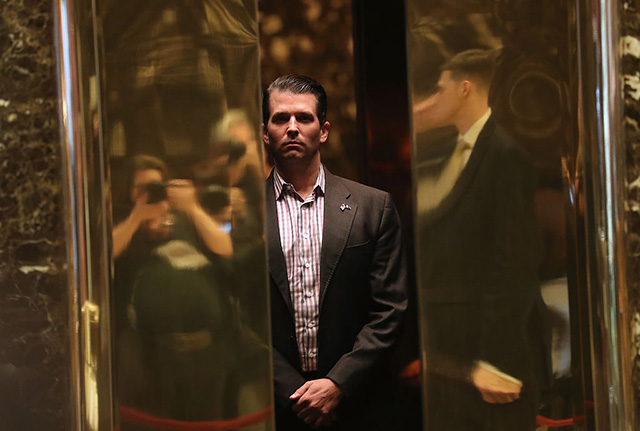
A stunning email thread released by Donald Trump Jr. on Tuesday shows the President’s son saying he “loves” the idea of obtaining incriminating information on Hillary Clinton from the Russian government.
The exchange also revealed that Trump Jr. was directly told that the Kremlin supports his father’s candidacy.
The existence of the emails contradict the Trump administration’s narrative on Russia, primarily that Moscow was not trying to aid Donald Trump’s candidacy last year, despite the conclusion of the US intelligence community.
In the back-and-forth, Trump Jr. is told by British promoter and friend Rob Goldstone that the “Crown Prosecutor of Russia” was interested in providing the Trump campaign with “official documents and information that would incriminate Hillary and her dealing with Russia.”
There is no “crown prosecutor” in Russia, but Goldstone may have been referring to the Russian prosecutor general, Yuri Yakovlevich.
Goldstone goes on to inform Trump Jr. that “this is obviously very high level and sensitive information but is part of Russia and its government’s support for Mr. Trump.”
In response, Trump Jr. wrote “if it’s what you say I love it especially later in the summer.”
A few days later, Goldstone sets up a meeting for Trump Jr. to discuss the matter further with a Russian lawyer, Natalia Veselnitskaya, who the New York Times reports is “known to be close” with Russian prosecutor general Yakovlevich.
The Times was going to publish the emails before Trump Jr. released them on his own through Twitter. The paper has for days been reporting on the meeting Trump Jr. eventually had with Veselnitskaya on June 9, shortly after Trump clinched the GOP nomination.
The rendezvous took place in the future President’s son’s office in Trump Towers, in New York City, one floor below the elder Trump’s office. Also in attendance for the meeting were Trump’s son-in-law Jared Kushner and newly-enshrined campaign chairman at the time, Paul Manafort. Trump Jr. claimed that his father was not told of meeting.
Exactly what was discussed is still unknown. Both Trump Jr. and Veselnitskaya have claimed that the primary topic of the meeting was the Magnitsky Act — a law that provides for sanctions against Russian officials.
In an interview with NBC, Veselnitskaya claimed she did not have any damaging information to provide the Trump campaign. She also claimed that Kushner left the meeting early and Manafort spent most of the time looking at his phone.
There’s no indication that alleged Russian hacking activities were discussed in the meeting. The sit-down took place shortly before Wikileaks began publishing leaked internal emails from the Democratic National Committee (DNC). Those records were hacked, according to the US government, by Russian military and intelligence services.
It’s also unclear if Trump Jr. broke the law by accepting the meeting. Campaign finance law prohibits political entities from receiving things of value — money or opposition research — from foreign entities. Trump Jr. claims the meeting was unproductive and didn’t result in the acquisition of any opposition research.
The emails do display, however, a pattern of behavior from Trump campaign officials that suggest a willingness to coordinate with a foreign power to swing an election. Such evidence could be fruitful for the ongoing counterintelligence investigation at the Department of Justice, which is currently being led by Robert Mueller.
Lawmakers on Capitol Hill were gobsmacked by the revelation. Sen. Tim Kaine (D-Va.) said Trump Jr. may have committed “treason.”
Members of Trump’s own party were concerned, too. “That email is disturbing,” Sen. Lindsay Graham (R-S.C.) told reporters. “I know Donald Trump Jr. is new to politics, I know that Jared Kushner is new to politics, but this is going to require a lot of questions to be asked and answered.”
Despite the bombshell news reports on Tuesday, the Trump administration declined again on Tuesday to hold an on-camera White House press briefing.
Our most important fundraising appeal of the year
December is the most critical time of year for Truthout, because our nonprofit news is funded almost entirely by individual donations from readers like you. So before you navigate away, we ask that you take just a second to support Truthout with a tax-deductible donation.
This year is a little different. We are up against a far-reaching, wide-scale attack on press freedom coming from the Trump administration. 2025 was a year of frightening censorship, news industry corporate consolidation, and worsening financial conditions for progressive nonprofits across the board.
We can only resist Trump’s agenda by cultivating a strong base of support. The right-wing mediasphere is funded comfortably by billionaire owners and venture capitalist philanthropists. At Truthout, we have you.
We’ve set an ambitious target for our year-end campaign — a goal of $230,000 to keep up our fight against authoritarianism in 2026. Please take a meaningful action in this fight: make a one-time or monthly donation to Truthout before December 31. If you have the means, please dig deep.